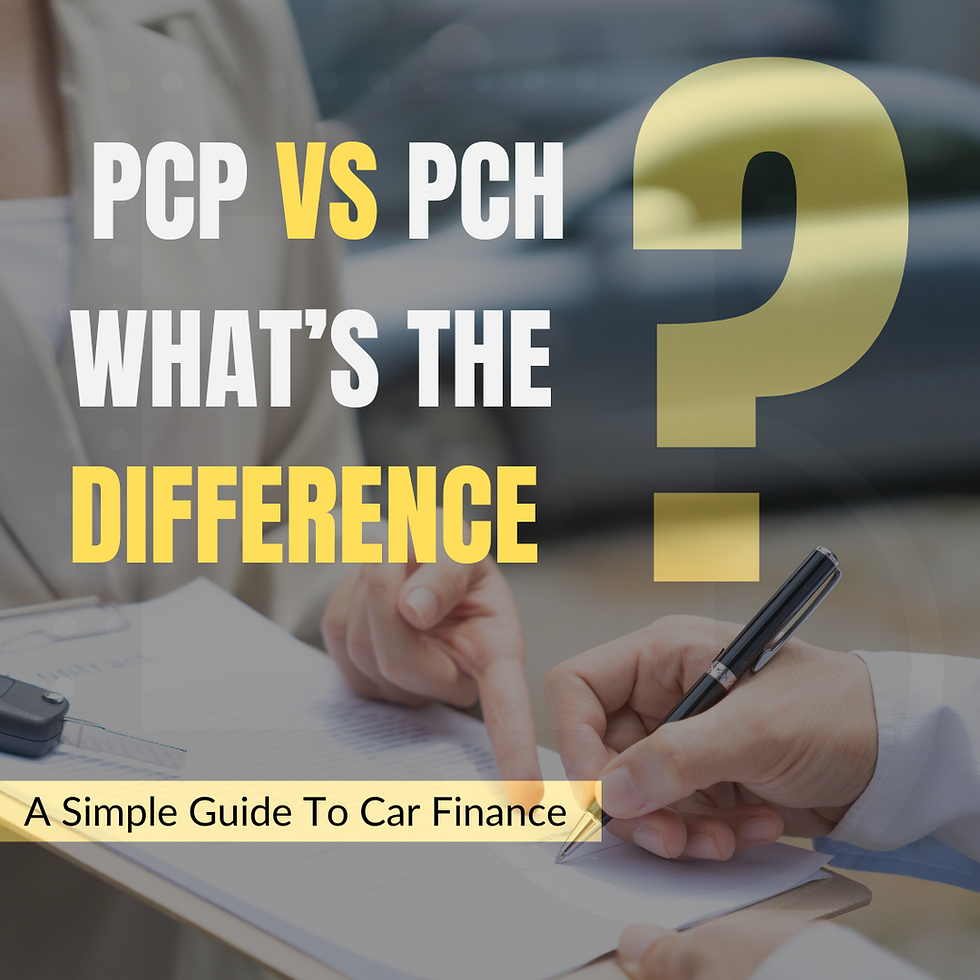
Rev your engines folks, we are diving into the world of PCP and PCH finance agreements. We are often asked by car buyers how a PCP (Personal Contract Plan) and PCH (Personal Contract Hire) differ. Whilst they may sound like similar agreements, they’re very different in how they work, and how flexible they are over the term of the agreement.
A Brief Overview of PCP and PCH
A Personal Contract Plan (PCP) is a popular, versatile financing choice for individuals and companies, applicable to both new and used cars. PCP’s let you finance the full price of the car or pay a deposit, followed by monthly payments and a final 'bubble' - the Guaranteed Future Value (GFV). The GFV is a value the finance company guarantees the car will be worth at the end of your finance term, and is an optional payment. At the end of the term, you have the option to own the car, trade-it in for another shiny new car, or hand it back and walk away. The GFV is like your financial crystal ball, predicting the future value of your car and (hopefully) providing some equity in your car at the end of the term. Best of all, if your car’s trade-in value has dropped below the GFV, you hand the car back and walk away! PCP is a flexible financing option, allowing for ownership at the end of the term if desired. Now let’s take a look at Personal Contract Hire (PCH) which is the leasing trendsetter for new cars! No ownership, just an optional upfront advance rental, followed by monthly rentals and then hand the car back - perfect for those who prefer not to have ownership commitments. Contract Hire is a popular choice for both private individuals and companies, and there are many online leasing companies offering great deals. With this type of finance arrangement, the rentals are subject to VAT, there are no ‘options’ at the end to own your car and the vehicle is handed back to the leasing company.
Ownership vs Leasing Ownership means that you have the legal right to use and dispose of the car as you see fit. You can drive it as much as you want, modify it however you want, and sell it or trade it in whenever you want. You are also responsible for all of the costs associated with owning a car, including maintenance, repairs, insurance, and registration.
Leasing is a contract that allows you to use a car for a specific period of time, typically one to four years. You make monthly payments to the leasing company, and at the end of the lease term, you return the car to the dealer. You do not own the car, and you do not have the right to sell it or trade it in.
Monthly Payments & Deposits Now, let's talk numbers. The PCP payment profile includes an optional deposit, followed by monthly payments and finally, the GFV. Lenders often cap the deposit at 30% of the car's purchase price. With PCH, you start with an optional upfront payment, then pay monthly rentals, and finally return the car. Usually, the advance rentals are based on 3, 6, 9, or 12 months' rentals, but some companies let you pay a higher upfront amount, which lowers your monthly rental cost throughout the term of the agreement. Unlike PCP, there is no possibility of receiving any equity.
Mileage Limits* Both PCP and PCH factor in your predicted annual mileage when calculating the monthly payment amount. Exceeding the predicted mileage will lead to excess mileage charges, so it is important to choose a realistic annual mileage.
End Of Agreement Options As already mentioned, a PCP is a flexible option and allows you to trade the car in, keep the car (by paying the GFV) or hand the car back and walk away. If you trade the car in and there is equity – you receive the equity. If your car‘s value is lower than the GFV, you simply hand the car back and walk away*. With a Contract Hire agreement (PCH), the only option at the end is to hand the car back to the lease or finance company. There is no option to own or keep the car. Terminating The Agreement Early There are a number of reasons why you might need to terminate your agreement early including a change of finances/family circumstances, a vehicle write off, the car is no longer suitable – or you just fancy a change! If you have arranged a Personal Contract Plans (PCP) the agreement can be terminated early. The finance company will provide you with an early settlement fee, which if higher than the current value of your car – you will have to pay the difference. If the settlement figure is lower than the value of the car – you keep the equity. If you have arranged a Contract Hire (PCH) these can be more costly to terminate as you will be liable for the outstanding rentals or a percentage of the outstanding rentals. In summary Exploring the roads of vehicle finance, PCP and PCH stand as distinct journeys. PCP offers flexibility, allowing for ownership, trade-ins, or a walk away option. In contrast, PCH is perfect for those who prefer driving without ownership commitments. PCP involves a final 'bubble' payment (GFV), potentially providing equity, while PCH is a straightforward ‘rental’. Understanding these finance options ensures a smooth drive on your car-buying journey! For more information on PCP and PCH agreements or to find the latest car deals, discounts, savings or advice visit www.carbuyersavings.co.uk!! #carbuyersavings #carfinance #carleasing #cardeals #carsavings


Comments